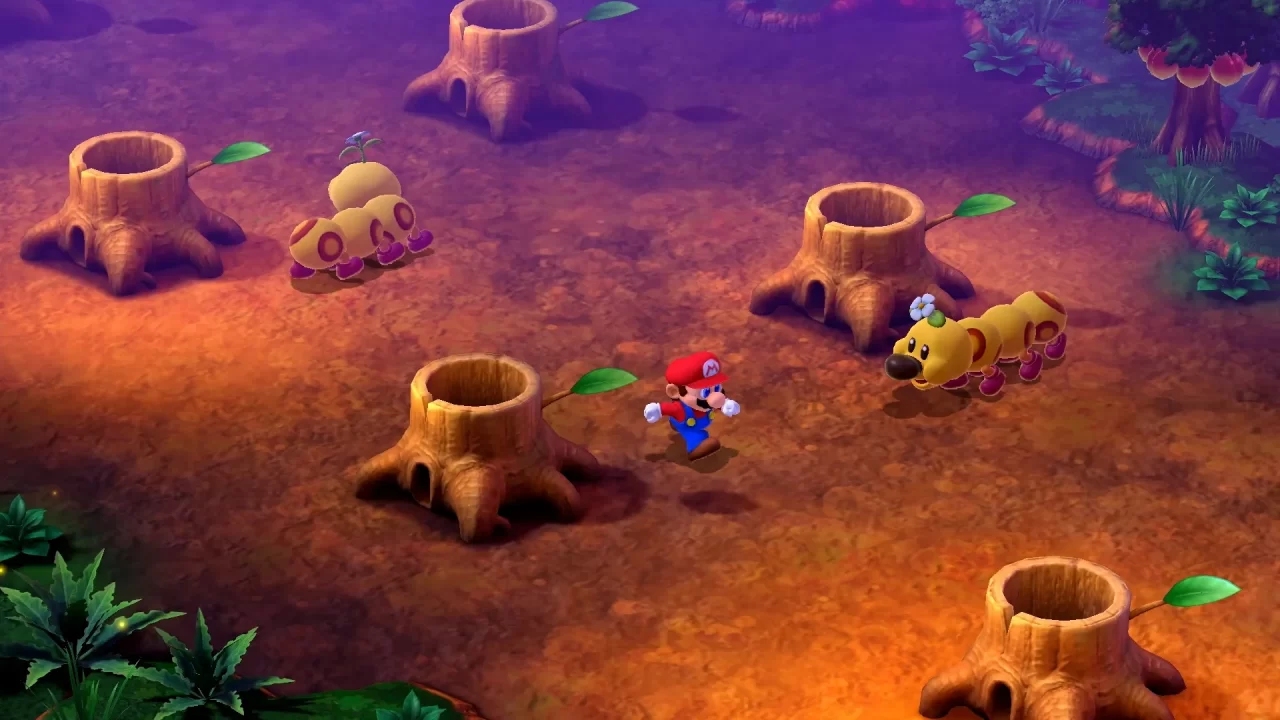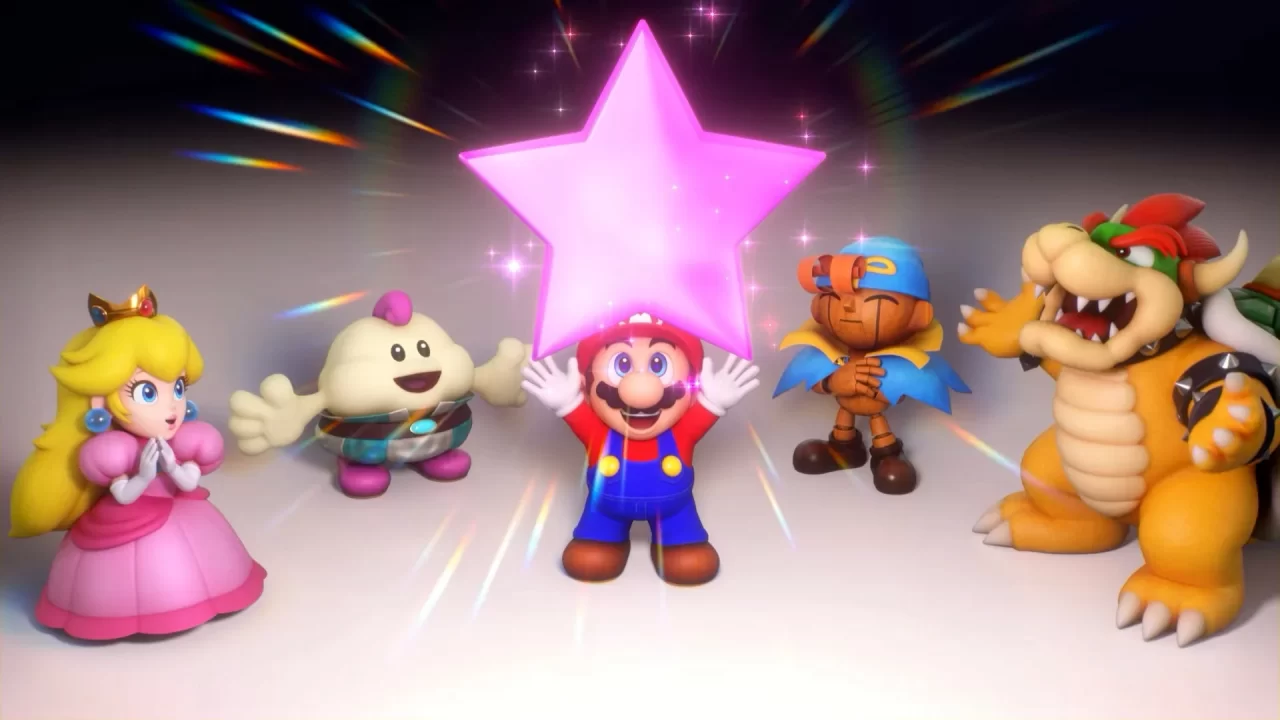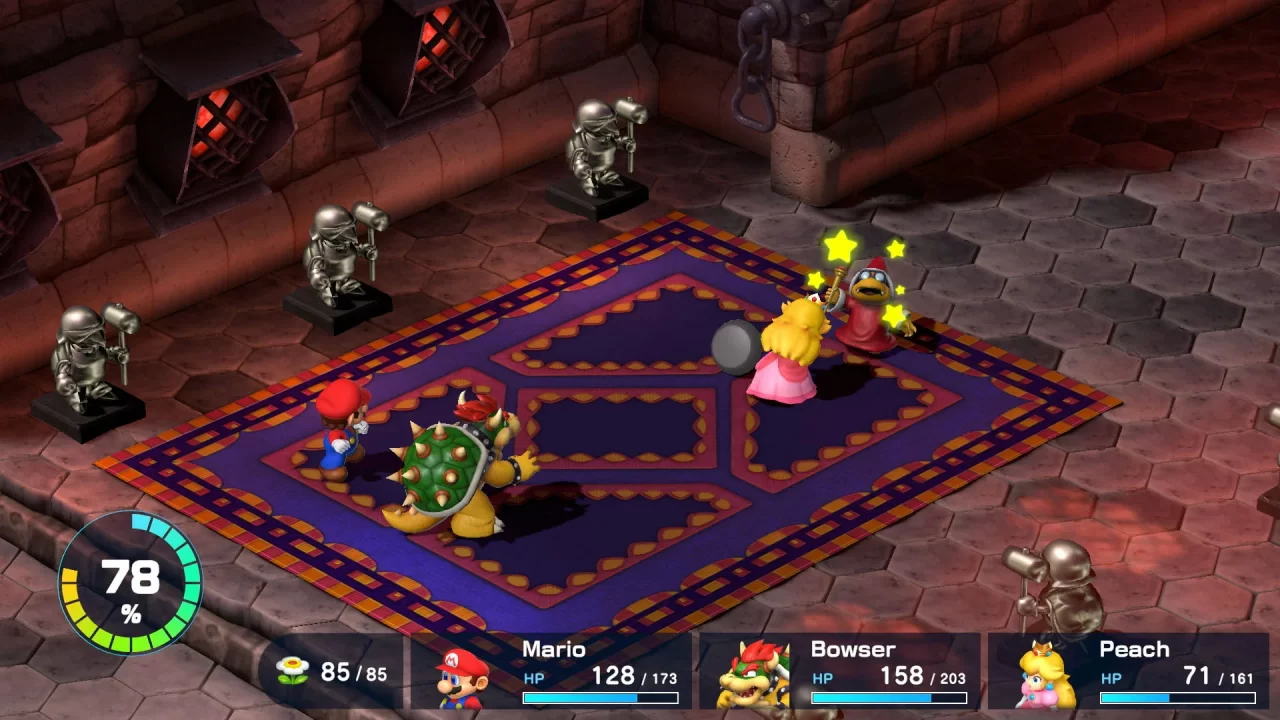The original Super Mario RPG, released in 1996 for the SNES, holds a special place in my heart. It was my first RPG, and I had no idea what an RPG even was at the time. It wasn’t until later that I learned what the acronym meant, and I realized that Mario and company helped usher in my love of the genre. So you can imagine my excitement when Nintendo revealed earlier this year that a remake of the game would release on Switch. Honestly, if you’re reading this review, you probably share my excitement, and with good reason. Super Mario RPG: Legend of the Seven Stars is a beloved fusion of Nintendo’s classic characters and world with Square Enix’s — back then, just Square’s — RPG pedigree. The remake, which drops the subtitle, is an incredibly faithful recreation of that beloved RPG. Faithful to a fault, even, as it recreates not only the original’s strengths but also its weaknesses.
Super Mario RPG begins as any Mario game does: Bowser abducts Princess Peach yet again, and the mustachioed hero rushes off to save her. This time, however, the usual rescue routine is interrupted by the appearance of a giant sword that crashes into Bowser’s Keep, sending all the occupants flying. Mario sets off to find the princess and figure out who is causing trouble, which as you can imagine, leads him on a globe-trotting adventure and nets him some new friends in the process. It’s a pretty basic setup for an RPG, and the journey isn’t terribly long either, but it’s charming from start to finish. The original characters, like “tadpole” Mallow and doll-come-to-life Geno, are great additions to the Mario universe, though none of them get any more development than what was present in the original version of the game.
This is true for nearly every other aspect of Super Mario RPG. The graphics are new and pretty, of course, but the art style is the same, the isometric maps are the same, the dialogue is mostly the same, and the content is 99% the same. I mention this not as a complaint, per se, but rather as a way of setting expectations. This is almost entirely the same game you played on the SNES, just with a coat of new paint. Even the handful of beautiful new cinematics only replace existing cutscenes, and they still include dialogue, which is awkwardly presented via subtitles and not voice acting. The only significant additions are some new combat mechanics and a series of post-game superbosses, which are challenging but also don’t take long to defeat.
Speaking of combat, the basics remain unchanged. Your chosen party of three take turns attacking enemies with either physical strikes or special moves, and every attack has a gimmick to it that can increase the damage dealt. Most require a button press at a specific time, but some will ask you to hold the button or rotate the left analog stick to charge up a move. Similarly, enemy attacks can be blocked by timing button presses, although AOE moves are unblockable by default. These Action Commands, as the game calls them, were one of the defining features of the original Super Mario RPG, and the remake adds a few extra twists. First, timing attacks and blocks perfectly confers added bonuses like AOE damage. Second, maintaining a chain of Action Commands gifts you with stacking buffs depending on your party makeup. Finally, successfully inputting Action Commands increases a new gauge that sits in the bottom left corner of the screen. When this gauge fills up, you can unleash a flashy Triple Move where your current three party members combine their skills to deal massive damage to enemies, heal, or buff your party. Each combination of party members corresponds to a different Triple Move, which adds a little bit of strategy to character selection.
The downside of all these new additions is that Super Mario RPG is now entirely too easy. To be fair, the original version was also pretty easy, but the remake feels noticeably easier. One or two basic attacks can thwart enemies, and even boss fights that I remembered as taxing in the SNES version take less time and effort to best. The weird thing about this is that developer ArtePiazza actually added difficulty options, but only an easy mode, which feels a little superfluous considering how easy the default mode is. A hard mode would have been much appreciated because the combat is fun, but there’s just no challenge to it. The new post-game superbosses help a little, and there are special enemies with higher stats that randomly appear in regular battles, but it’s too little too late. Combat is still an overall enjoyable experience, of course, but it could have been balanced a little better.
One absolute joy in this new version of Super Mario RPG is the music. Yoko Shimomura’s soundtrack for the SNES version remains a favorite for many RPG fans, myself included, and she returns to provide modernized accompaniment for the remake. The arrangements are lovely, following the original music closely but throwing in a few unexpected tweaks like key shifts and instrumentation changes to add variety to the tracks. There’s even a neat feature where extra percussion gets added to battle tracks when you reach a high enough Action Command chain. If you’re not feeling the new arrangements or you want to listen to the original SNES music, there’s an option to switch to the classic soundtrack. Beating the game also unlocks a sound player where you can listen to both versions of the soundtrack to your heart’s content. These are admittedly little things, but it’s always nice to see features like this with remakes and remasters where players often have fond memories of the original music.

Finally, a brief word about performance. While Super Mario RPG generally runs well, it doesn’t always run smoothly. The game mostly hits its 60FPS target, but there are numerous occasions where moving through a map causes the frame rate to noticeably hitch and feel uneven. This never seems to happen in battle nor in any platforming sequences, so it doesn’t really impact gameplay. Rather, it’s just a visual quirk that slightly mars the experience from time to time. Nothing game-breaking, but it did occasionally distract me enough to feel it warranted a mention.
All in all, Super Mario RPG is a great remake that nearly perfectly replicates the experience of playing the SNES original. From the story and the world to the battles and music, the game will make you feel like a kid again. I do wish the combat was a little harder, and some players may be a tad disappointed by the lack of meaningful new content, but the game is so charming and fun that it’s easy to overlook issues like this and have a good time with it. After almost three decades, we finally have a modern version of the game that introduced many players to RPGs, and with luck it may introduce many more to come.




